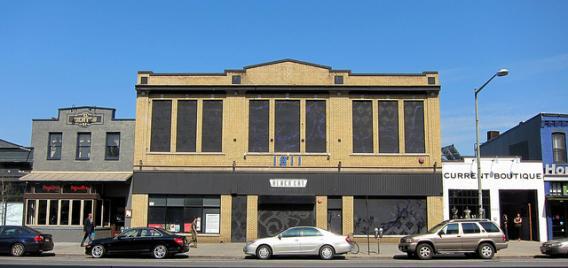Brandon Gentry’s history of the Black Cat in commemoration of its 20th anniversary is a must-read for anyone interested in DC history, but near the end of the piece the club’s owner veers off on some interesting economic themes. According to the owner of this veteran music venue, it’s a bad thing for the city’s music fans that he faces more competition today than he did ten or fifteen years ago:
The emergence of venues like DC9, the Rock & Roll Hotel, and U Street Music Hall has also altered D.C.’s live music landscape, providing more places for bands to play and increasing competition for music fans. “Competing over shows is annoying from a business standpoint because you end up paying a band too much money, and then the ticket prices go up,” says Ferrando. “Where people think of competition as something that drives prices down, it does the opposite in this line of work; if me and the 9:30 Club are going after the same band, the only way to pay them more is for the ticket price to go up.”
Plus, the proliferation of clubs means more shows, which, at least according to Ferrando, has negatively impacted D.C.’s local music scene. “One thing I’ve noticed that really bums me out is that the local bands play as much as they’re asked to, basically. You can’t fault them; they’re not really thinking about it that much. If I offer them a cool show, they’ll take it. If Rock & Roll Hotel or DC9 offers them a cool show, they’ll take it. But next thing you know, that half-decent local band is playing three shows in three months. But if you’re their fan or a friend of theirs, but they’re not your favorite local band, you’re not going to go to all three shows. You’re going to go to one of them, whichever one is closest to your house or at whichever bar you tend to frequent more. And because of that, that band doesn’t draw that many people at any of those shows. They don’t have that ability to create a scene around them of people who are really excited about their band.”
Color me skeptical about the idea that competition between clubs drives up ticket prices. For any given show, there’s a revenue-maximizing ticket price that the club owner is going to want to charge regardless of how much he has to pay the band. If the band gets paid more, the club’s profits fall. If the band gets paid less, the club’s profits rise. It’s of course true that if the club lucks into a super-profitable booking the clubs’ owners could choose to hand some of those profits over to ticket-buyers as an act of charity. But by the same token, a charitably-minded club owner could choose to accept a loss on a given show if he wants to. Nothing about the economics of the situation dictate that monopoly should lead to lower ticket prices.
The argument about the “scene” is more interesting. I think what you really want to say isn’t so much that a smaller number of venues is better, but that the optimal scenario involves a high ratio of bands to venues. If the supply of venues expands faster than the supply of bands, then you end up with an undesirable equilibrium where the bands play too frequently and the rooms aren’t full enough.
